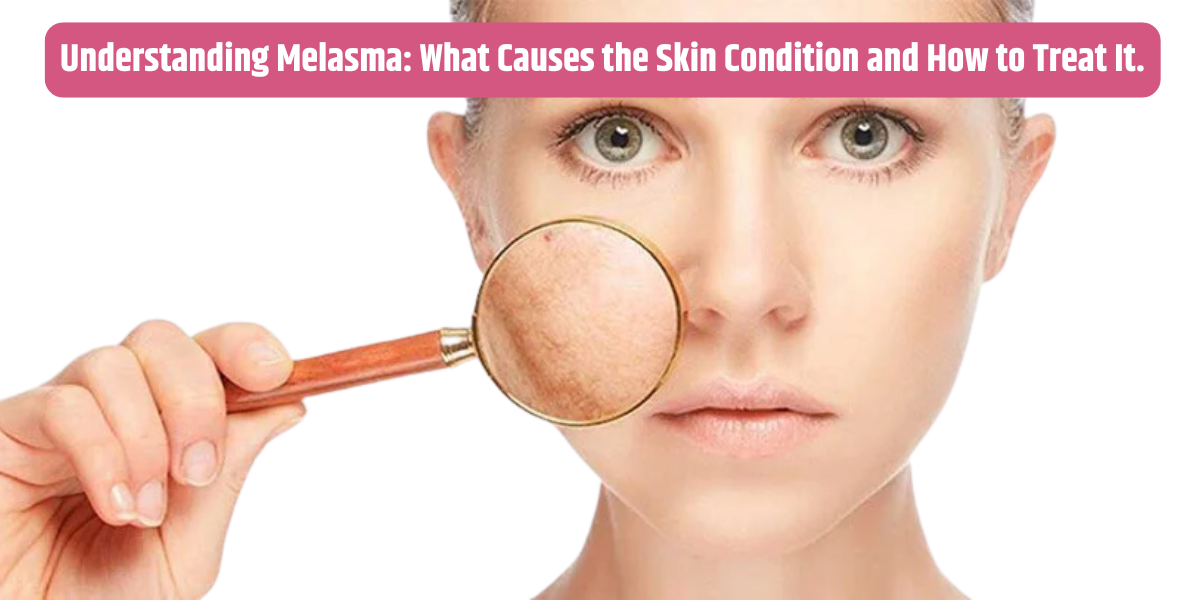Understanding Melasma: What Causes the Skin Condition and How to Treat It.
What is melasma?
Who gets melasma?
Melasma can affect anyone, but it’s more common in women, especially those with darker skin tones. Hormonal changes, such as those during pregnancy or while using hormonal birth control, can increase the likelihood of developing melasma. This is why it’s sometimes called the “mask of pregnancy.”
What causes melasma?
The exact cause isn’t fully understood, but several factors can trigger melasma, including:
- Sun exposure: UV rays stimulate pigment-producing cells in the skin, making melasma worse.
- Hormonal changes: fluctuations in hormones, often from pregnancy, birth control pills, or hormone therapy, can play a role.
- Genetics: A family history of melasma can increase the risk.
- Certain skincare products: harmful or irritating products can sometimes trigger or worsen melasma.
Is melasma harmful?
Melasma is not harmful and does not lead to any serious health issues. However, it can affect a person’s confidence due to its appearance.
Can melasma go away on its own?
In some cases, melasma fades without treatment, particularly if it was triggered by pregnancy or birth control pills and the hormones have returned to normal levels. However, for many people, it may persist and require treatment to lighten the patches. For those seeking professional help, Dermadent Laser Clinic offers treatments that may help improve the appearance of melasma.
How is melasma treated?
There are several ways to manage melasma. Treatment focuses on lightening the patches and preventing new ones from forming.
- Sun protection: Wearing sunscreen daily is one of the most important steps in managing melasma. Look for a broad-spectrum sunscreen with SPF 30 or higher and reapply regularly.
- Topical creams: Skin-lightening creams with ingredients like hydroquinone, azelaic acid, kojic acid, or tranexamic acid can help reduce pigmentation.
- Prescription treatments: A dermatologist may recommend stronger creams or a combination of ingredients to target melasma.
- Procedures: Options like chemical peels, microdermabrasion, or laser therapy may be suggested for stubborn melasma.
Can melasma be prevented?
While it may not be possible to prevent melasma entirely, you can reduce your risk and minimize flare-ups by:
- Wearing sunscreen daily and avoiding prolonged sun exposure.
- Using protective clothing like wide-brimmed hats when outdoors.
- Avoiding harsh skincare products that might irritate the skin.
- Managing hormonal triggers with advice from a healthcare provider.
Is melasma a permanent condition?
For some people, melasma may clear up with time and treatment. For others, it can be a long-term condition that requires ongoing care to manage. Staying consistent with protective measures and treatments is key. If you need help managing melasma, the dermatology clinic in Dhankawadi provides specialized care to guide you through the process.
Melasma is a skin condition that can be frustrating to deal with, but there are steps you can take to manage it effectively. By understanding its causes and using protective strategies, you can reduce its appearance and keep your skin healthy. If you’re unsure about treatment options, consulting Dr. Priyanka Tambe at Dermadent Laser Clinic will help you find the right approach.


